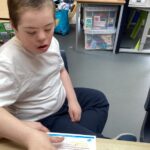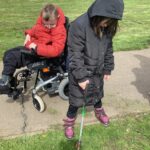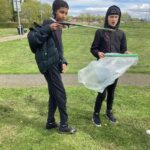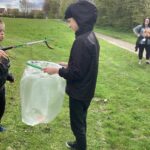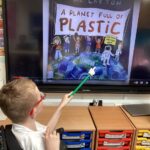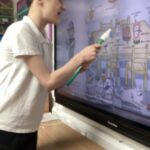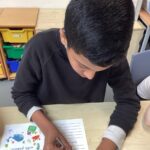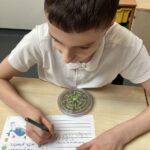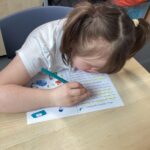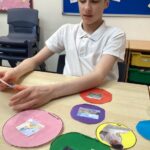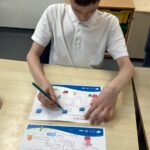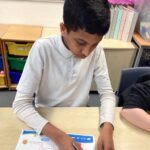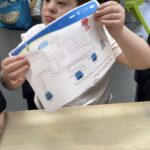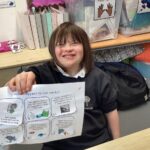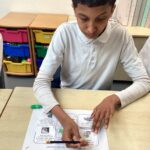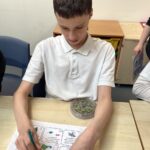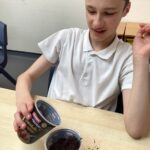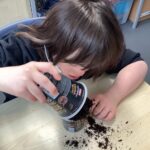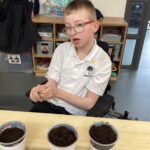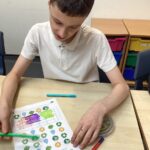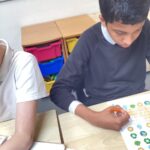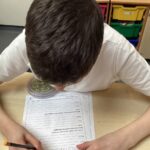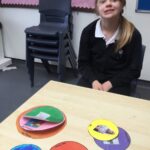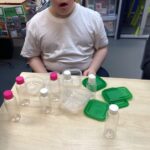Group 1 celebrated Earth Day by taking part in lots of different activities. The Earth day theme this year was fighting plastic pollution. We got messy burying some plastic, an apple and some paper in soil, then writing down our predictions what we think will happen. We will find out in 4 weeks if our predictions came true! The book A Planet Full of Plastic was enjoyed by group 1, we read it and answered some questions before writing about what we felt the biggest problems with single use plastics were and thought of things we could do to help. We went on a litter pick in the local park and analysed the litter we collected before making and reading some graphs. We also looked at how plastic could enter the food chain. We explored the life cycle of plastic, made pictures from salt and glue and completed a scavenger hunt. We completed some recycling tasks and learned about plastic in our oceans.
Tag Archives: Language Skills (Secondary)
Language Skills (Secondary)
Good morning everyone,
Please see today’s activity choices below:
Option 1 (daily activity) – Early Level
Senses scavenger hunt: hear
Make a list of a-z on a piece of paper and go for a walk outside with a family member(s); note down all the things that you can hear that begin with letters of the alphabet e.g. b – bird.
How many did you manage to get?
Option 2 (daily activity) – First Level
Sentence scavenger hunt: hear
Go for a walk outside with a family member(s) and notice all the things that you can hear. When you get home, write down five sentences that include a full stop, capital letter and connectives e.g. and, so, but, then.
Option 3 (week long activity) – First Level and beyond
Summary
Each day this week, you are going to choose a different news item to research: https://www.bbc.co.uk/newsround.
Read the article and then write a summary (the key points) of what it is about. Remember to include the following:
- Who?
- What?
- When?
- Where?
- Why?
Include no more than five bullet points. Ask yourself: will people be interested or is my message too long to read? Remember to stick to the key points.
After your writing, discuss the key points with a family member. Ask what their opinion (what they think) is and explain your own viewpoint. Try to give at least one reason for your opinion.
Option 4 (browse the web)
Explore one or more of the following websites to find something of interest and benefit to you:
https://learnenglishkids.britishcouncil.org/short-stories
http://www.literactive.com/Home/index.asp
https://www.phonicsplay.co.uk/
https://www.scottishbooktrust.com
https://www.storylineonline.net/
https://schoolreadinglist.co.uk/
Good luck!
Laura (Language Teacher)
Language Skills (Secondary)
Good morning everyone,
Hope you have had a lovely weekend.
Please see today’s activity choices below:
Option 1 (daily activity) – Early Level
Senses scavenger hunt: see
Make a list of a-z on a piece of paper and go for a walk outside with a family member(s); note down all the things that you can see that begin with letters of the alphabet e.g. b – bus.
How many did you manage to get?
Option 2 (daily activity) – First Level
Sentence scavenger hunt: see
Go for a walk outside with a family member(s) and notice all the things that you can see. When you get home, write down five sentences that include a full stop, capital letter and connectives e.g. and, so, but, then.
Option 3 (week long activity) – First Level and beyond
Summary
Each day this week, you are going to choose a different news item to research: https://www.bbc.co.uk/newsround.
Read the article and then write a summary (the key points) of what it is about. Remember to include the following:
- Who?
- What?
- When?
- Where?
- Why?
Include no more than five bullet points. Ask yourself: will people be interested or is my message too long to read? Remember to stick to the key points.
After your writing, discuss the key points with a family member. Ask what their opinion (what they think) is and explain your own viewpoint. Try to give at least one reason for your opinion.
Option 4 (browse the web)
Explore one or more of the following websites to find something of interest and benefit to you:
https://learnenglishkids.britishcouncil.org/short-stories
http://www.literactive.com/Home/index.asp
https://www.phonicsplay.co.uk/
https://www.scottishbooktrust.com
https://www.storylineonline.net/
https://schoolreadinglist.co.uk/
Good luck!
Laura (Language Teacher)
Language Skills (Secondary)
Good morning everyone,
Below are some activity choices for this week:
Option 1 (daily activity) – Early Level
Practice activity
Choose an activity from this week that you feel you could practise more and have another go.
Remember, practice makes better!
Option 2 (week long activity) – First Level and beyond
Diary
You are going to create your own diary. First, research some famous dairies, e.g. The Diary of a Young Girl by Anne Frank – google an excerpt to look at the format (how it is laid out).
Now, it’s your turn!
Create your own personal diary and design the front cover which should reflect your personality.
Every day make a diary entry that explains the events and experiences of your day.
The key features of a diary are explained below:
- describes the places where events happened
- is written in the past tense
- talks about the most important events
- uses some personal pronouns: I, we, my, me
- talks about feelings
- uses time conjunctions (e.g. before, next, after) to show when things happened.
Try to think about your choice of words to make your writing more interesting by using adverbs and adjectives.
An adverb – a word that describes a verb (an action or doing word). E.g. I ate (verb) my breakfast slowly (adverb).
An adjective – a word that describes a noun (the name of a thing or place). E.g. I played a fun (adjective) game (noun).
Option 3 (browse the web)
Explore one or more of the following websites to find something of interest and benefit to you:
https://learnenglishkids.britishcouncil.org/short-stories
http://www.literactive.com/Home/index.asp
https://www.phonicsplay.co.uk/
https://www.scottishbooktrust.com
https://www.storylineonline.net/
https://schoolreadinglist.co.uk/
Good luck and have a lovely weekend!
Laura (Language Teacher)
Language Skills (Secondary)
Good morning everyone,
Below are some activity choices for this week:
Option 1 (daily activity) – Early Level
Writing lower and uppercase letters
Ask an adult to shout out all lowercase letters and write them down.
How many can you manage without looking?
If you are feeling confident then move on to uppercase letters.
Option 2 (week long activity) – First Level and beyond
Diary
You are going to create your own diary. First, research some famous dairies, e.g. The Diary of a Young Girl by Anne Frank – google an excerpt to look at the format (how it is laid out).
Now, it’s your turn!
Create your own personal diary and design the front cover which should reflect your personality.
Every day make a diary entry that explains the events and experiences of your day.
The key features of a diary are explained below:
- describes the places where events happened
- is written in the past tense
- talks about the most important events
- uses some personal pronouns: I, we, my, me
- talks about feelings
- uses time conjunctions (e.g. before, next, after) to show when things happened.
Try to think about your choice of words to make your writing more interesting by using adverbs and adjectives.
An adverb – a word that describes a verb (an action or doing word). E.g. I ate (verb) my breakfast slowly (adverb).
An adjective – a word that describes a noun (the name of a thing or place). E.g. I played a fun (adjective) game (noun).
Option 3 (browse the web)
Explore one or more of the following websites to find something of interest and benefit to you:
https://learnenglishkids.britishcouncil.org/short-stories
http://www.literactive.com/Home/index.asp
https://www.phonicsplay.co.uk/
https://www.scottishbooktrust.com
https://www.storylineonline.net/
https://schoolreadinglist.co.uk/
Good luck!
Laura (Language Teacher)
Language Skills (Secondary)
Good morning everyone,
Below are some activity choices for this week:
Option 1 (daily activity) – Early Level
Matching lower and uppercase letters
Write out all lowercase letters (in one colour of pen) and uppercase letters (in a different colour of pen).
Now try to match them. How many can you manage?
Option 2 (week long activity) – First Level and beyond
Diary
You are going to create your own diary. First, research some famous dairies, e.g. The Diary of a Young Girl by Anne Frank – google an excerpt to look at the format (how it is laid out).
Now, it’s your turn!
Create your own personal diary and design the front cover which should reflect your personality.
Every day make a diary entry that explains the events and experiences of your day.
The key features of a diary are explained below:
- describes the places where events happened
- is written in the past tense
- talks about the most important events
- uses some personal pronouns: I, we, my, me
- talks about feelings
- uses time conjunctions (e.g. before, next, after) to show when things happened.
Try to think about your choice of words to make your writing more interesting by using adverbs and adjectives.
An adverb – a word that describes a verb (an action or doing word). E.g. I ate (verb) my breakfast slowly (adverb).
An adjective – a word that describes a noun (the name of a thing or place). E.g. I played a fun (adjective) game (noun).
Option 3 (browse the web)
Explore one or more of the following websites to find something of interest and benefit to you:
https://learnenglishkids.britishcouncil.org/short-stories
http://www.literactive.com/Home/index.asp
https://www.phonicsplay.co.uk/
https://www.scottishbooktrust.com
https://www.storylineonline.net/
https://schoolreadinglist.co.uk/
Good luck!
Laura (Language Teacher)
Language Skills (Secondary)
Good morning everyone,
Below are some activity choices for this week:
Option 1 (daily activity) – Early Level
Lower and uppercase letters
Look over your alphabet list from yesterday and say each sound aloud. Practise reading and writing lowercase letters (a, b, c).
Once you are confident with this, move on to uppercase letters (A, B, C).
Option 2 (week long activity) – First Level and beyond
Diary
You are going to create your own diary. First, research some famous dairies, e.g. The Diary of a Young Girl by Anne Frank – google an excerpt to look at the format (how it is laid out).
Now, it’s your turn!
Create your own personal diary and design the front cover which should reflect your personality.
Every day make a diary entry that explains the events and experiences of your day.
The key features of a diary are explained below:
- describes the places where events happened
- is written in the past tense
- talks about the most important events
- uses some personal pronouns: I, we, my, me
- talks about feelings
- uses time conjunctions (e.g. before, next, after) to show when things happened.
Try to think about your choice of words to make your writing more interesting by using adverbs and adjectives.
An adverb – a word that describes a verb (an action or doing word). E.g. I ate (verb) my breakfast slowly (adverb).
An adjective – a word that describes a noun (the name of a thing or place). E.g. I played a fun (adjective) game (noun).
Option 3 (browse the web)
Explore one or more of the following websites to find something of interest and benefit to you:
https://learnenglishkids.britishcouncil.org/short-stories
http://www.literactive.com/Home/index.asp
https://www.phonicsplay.co.uk/
https://www.scottishbooktrust.com
https://www.storylineonline.net/
https://schoolreadinglist.co.uk/
Good luck!
Laura (Language Teacher)
Language Skills (Secondary)
Good morning everyone,
A Happy New Year to you all!
I hope you enjoyed the Christmas holidays and had a chance to relax with your family.
Below are some activity choices for this week:
Option 1 (daily activity) – Early Level
Alphabet list
We all celebrated the recent holiday, for each of us, the focus would be different, for example, for some, it’s about the meaning of Christmas, for others, it’s about the giving and receiving of presents, family time or a winter holiday (even a mixture of these).
You are going to create an alphabet list based on the focus of your holiday. For example:
Christmas alphabet – b – baubles, p – presents
Gift alphabet – c – chocolate, s – socks
Family – f – fun, m – movies
Winter holiday – s – snow, g – games
So, for example, if you choose the Gift alphabet, you would write down a-z on paper, and next to each letter, you would write down an item that either you or a family member received for Christmas. How many can you remember?
Option 2 (week long activity) – First Level and beyond
Diary
You are going to create your own diary. First, research some famous dairies, e.g. The Diary of a Young Girl by Anne Frank – google an excerpt to look at the format (how it is laid out).
Now, it’s your turn!
Create your own personal diary and design the front cover which should reflect your personality.
Every day make a diary entry that explains the events and experiences of your day.
The key features of a diary are explained below:
- describes the places where events happened
- is written in the past tense
- talks about the most important events
- uses some personal pronouns: I, we, my, me
- talks about feelings
- uses time conjunctions (e.g. before, next, after) to show when things happened.
Try to think about your choice of words to make your writing more interesting by using adverbs and adjectives.
An adverb – a word that describes a verb (an action or doing word). E.g. I ate (verb) my breakfast slowly (adverb).
An adjective – a word that describes a noun (the name of a thing or place). E.g. I played a fun (adjective) game (noun).
Option 3 (browse the web)
Explore one or more of the following websites to find something of interest and benefit to you:
https://learnenglishkids.britishcouncil.org/short-stories
http://www.literactive.com/Home/index.asp
https://www.phonicsplay.co.uk/
https://www.scottishbooktrust.com
https://www.storylineonline.net/
https://schoolreadinglist.co.uk/
Good luck!
Laura (Language Teacher)
Language Skills (Secondary)
Good morning everyone,
Our theme today for home-school learning is summer.
Here are some activities to choose from:
- Read and or listen to some poems. https://childrens.poetryarchive.org/explore/?key=&type=&poet=&theme=127&form=&age=
- Read and or listen to some poems and think about what they mean. https://childrens.poetryarchive.org/explore/?key=&type=&poet=&theme=127&form=&age=
- Research acrostic poems and create your own about SUMMER. https://www.bbc.co.uk/bitesize/topics/z4mmn39/articles/ztdvw6f
- Research haiku poems and create your own about https://www.youngwriters.co.uk/info/other/poetry-types/haiku-poem
- Create a poem about summer (it doesn’t have to rhyme).
Read the following poems about summer (they may also give you some ideas for your own poems):
Summer Days
I’m looking for a hot spot.
A what spot?
A hot spot.
I’m looking for a hot spot.
To lie out in the sun.
I’m looking for a hot spot
To play and have some fun.
I’m looking for a hot spot
To hit a ball and run.
Oh, I’m looking for a hot spot.
A what spot?
A hot spot.
I’m looking for a hot spot
Now summer has begun.
Anne English
Summer Song
By the sand between my toes,
By the waves behind my ears,
By the sunburn on my nose,
By the little salty tears
That make rainbows in the sun
When I squeeze my eyes and run,
By the way the seagulls screech,
Guess where I am? At the ……!
By the way the children shout
Guess what happened? School is ……!
By the way I sing this song
Guess if summer lasts too long:
You must answer Right or ……!
John Ciardi
Good luck!
Laura Leathem (Language and Communication Teacher)
Language Skills (Secondary)
Good morning everyone,
Here are today’s choice of activities https://sway.office.com/sVLcsX2cSrAiEjBV
Today is my last post. I would like to thank you all for your hard work during lockdown.
I hope you all have a great summer and will look forward to seeing some of you in August.
To all the leavers – Wishing you the very best of luck for your future! It’s been a pleasure getting to know you all.
Take care everyone!
Laura Leathem (Language and Communication Teacher)


